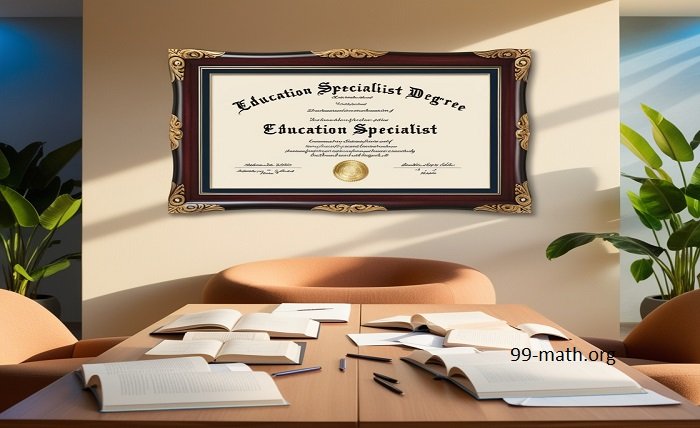Introduction
One cannot emphasize how important education specialist degree is in forming both individuals and societies. In order to effectively fulfill the ever-changing demands of educational institutions, educators must continuously adapt and improve their skills. A postgraduate degree called an Ed.S., or education specialist degree, provides a halfway ground between a master’s and a doctorate. It is designed for working professionals who want to deepen their area of expertise without committing to the lengthy research required for a Ph.D. or Ed.D.
What is an Education Specialist Degree
The Education Specialist (Ed.S.) degree is an advanced post-master’s degree intended for educators who want to specialize in particular areas of teaching. This degree fills the knowledge gap between a master’s and a doctorate by emphasizing advanced knowledge and practical skill enhancement over in-depth research. The Ed.S. program, which lasts one to two years on average, provides specialized instruction in areas like curriculum creation, special education, and educational leadership. In contrast to doctoral programs, which prioritize dissertations and original research, the Ed.S.
Why Pursue an Education Specialist Degree
For educators, there are several advantages to obtaining a degree in education specialist. First of all, it makes it possible for people to get advanced knowledge and specialized skills that are suited to particular educational difficulties, improving their capacity to make valuable contributions to their institutions. For individuals looking to progress in their professions, earning an Ed.S. degree is a wise decision because it gives them access to leadership positions and higher-level jobs in educational institutions. Aside from that, obtaining an Ed.S. might boost one’s earning potential because advanced degrees are frequently paid more. The curriculum also places a strong emphasis on professional development, giving graduates the problem-solving, strategic planning, and leadership abilities necessary to advance in the education industry.
Structure and Requirements of an Education Specialist Degree
An teaching Specialist education specialist degree‘s requirements and structure are meant to offer advanced, hands-on training in teaching. For working professionals, Ed.S. programs typically last one to two years and include full- or part-time education alternatives. Strong academic standing, significant professional experience, and a master’s degree in education or a related discipline are typically prerequisites for admission. A personal statement, letters of recommendation, and results from standardized tests may also be prerequisites for some programs. Advanced study in educational theory, research techniques, and specialist subjects like curriculum design or educational leadership are all part of the Ed.S. program’s curriculum.
Career Opportunities with an Education Specialist Degree
A education specialist degree in education specialization leads to numerous employment options in various educational fields. Graduates can work as principals or superintendents, or other educational administrators, who oversee daily operations in schools, create regulations, and spearhead instructional programs. A curriculum director is someone who supervises the creation and application of educational programs and curricula, making sure they adhere to standards and enhance student learning results. This is an additional job option. Those who are passionate about assisting students may pursue careers as school counselors by earning an Ed.S. with a counseling concentration, where they would assist students with their academic, professional, and personal growth.
Comparing the Education Specialist Degree to Other Advanced Degrees
There are a few notable distinctions between other advanced degrees and the education specialist degree (Ed.S.) degree. An Ed.S. degree offers more advanced and specialized training, preparing professionals for higher-level responsibilities, in contrast to a master’s degree, which gives basic knowledge. The Ed.S. places less emphasis on research requirements and more emphasis on professional growth and practical application than doctoral degrees like a Ph.D. or Ed.D, which call for substantial research and a dissertation. While Ed.S. programs are primarily focused on advanced practice and leadership, PhD programs place more emphasis on innovative contributions to the profession through research.
Finding the Right Education Specialist Program
Choosing the best education specialist degree Specialist program requires giving careful thought to a number of things. Having the program accredited guarantees that it adheres to strict academic requirements and that employers and other educational institutions will accept your degree. It’s crucial to investigate the program’s reputation, seeking for universities with reputable staff, successful student results, and a history of graduating students ready for leadership positions. Make sure the program’s specialization selections complement your interests and professional aspirations by giving them some thought.
Conclusion
For education specialist degree looking to progress in their professions and have a big impact on the industry, an Education Specialist degree is a useful credential. The Ed.S. offers a route to leadership positions and professional success with its emphasis on advanced knowledge, specific skills, and practical application. The Ed.S. can assist you in reaching your career objectives regardless of your interests in curriculum creation, school counseling, educational administration, or other specialized fields.
FAQ
What is the main difference between an Ed.S. and a Ph.D. in Education?
A Ph.D. requires substantial research and a dissertation, whereas an Ed.S. concentrates on professional growth and practical application. Whereas the Ph.D. places more emphasis on adding new information to the subject, the Ed.S. is usually shorter and more concentrated on advanced practice.
How long does it take to complete an education specialist degree?
The majority of Ed.S. programs require one to two years to finish, depending on whether you attend classes full- or part-time.read about more estoturf couplé.
Can I pursue an education specialist degree online?
Yes, a lot of universities provide flexible Ed.S. programs for working professionals that are available online or through hybrid formats.

